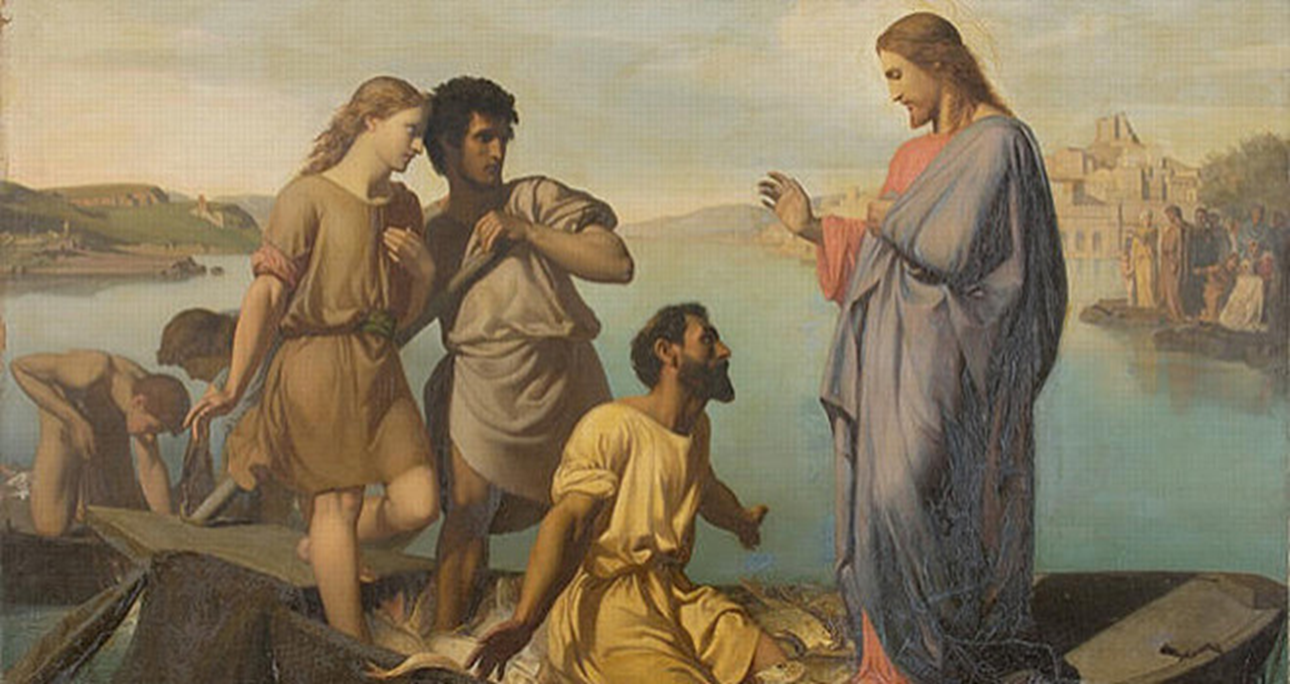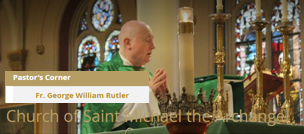 The Miraculous Draught, Henry Picou, 1850.
Fr. Rutler is such a fine writer and great mind in both spiritual and secular matters that like the late great Fr. Schall, he ought to be required reading for anyone who wants to be stimulated and edified...And to benefit from the nuggets of information one gathers from his erudition.
A great catch: The 153 fish
The Miraculous Draught, Henry Picou, 1850.
Fr. Rutler is such a fine writer and great mind in both spiritual and secular matters that like the late great Fr. Schall, he ought to be required reading for anyone who wants to be stimulated and edified...And to benefit from the nuggets of information one gathers from his erudition.
A great catch: The 153 fish
Did you ever wonder why 153?

by FR. GEORGE W. RUTLER
May 17, 2019
“I welcome you on the eve of a great battle.” So began General Dwight D. Eisenhower on May 15, 1944, solemnly addressing the admirals and generals and officers of the Allied Expeditionary Force, announcing the proposed strategy for Operation Overlord, codename for the Normandy invasion. Underestimated as an orator, Eisenhower’s speech riveted the attention of all in the tense atmosphere.
The location was an unlikely one: a lecture hall of Saint Paul’s School in London. The boys had already been evacuated to Berkshire during the Blitz. The top brass, who had arrived from the advance command post of the Supreme Headquarters of the Allied Forces at Southwick House in Hampshire, were seated on school chairs, with two armchairs occupied by King George VI and Prime Minister Winston Churchill. General Bernard Montgomery, the future Field Marshall, brought out his maps to show the British and American positions.
The school served as headquarters of the XXI Army Group under Montgomery, and he felt at home there because he was an Old Pauline. Planning took place in the office of his old Headmaster, or High Master, which was the title used from the day of the school’s foundation in 1509 by John Colet.
As a close friend of Erasmus, and an even closer spiritual advisor to Thomas More, Colet was the epitome of a Renaissance humanist, laden with learning he had brought back from France and Italy for lectures in his own university at Oxford. More lured him back to his birthplace of London where his father had been a rich merchant and twice Lord Mayor.
As Dean of Saint Paul’s cathedral, Colet put his reforming principles to work with eloquent imprecations against the pride, concupiscence, covetousness, and worldly absorptions that had tainted the priesthood. Archbishop Warham of Canterbury dismissed frivolous charges of heresy brought against Colet by offended clerics. Colet’s combination of charm and audacity engendered the respect even of Henry VIII, despite his bold preaching against the king’s French wars.
As a priest with no children of his own, and no nieces or nephews because all twenty-two of his siblings had died in childhood, Colet devoted much of his inherited fortune to founding Saint Paul’s school for teaching 153 boys literature, manners, and, with Renaissance flair, Greek on a par with Latin.
Erasmus said that when Colet lectured he thought he was hearing a second Plato. If so, his Platonism was Christian. He wanted a great catch, similar to the 153 fish that the apostles had hauled in at the command of the Risen Christ. The boys would be welcome “from all nations and countries indifferently.”
The catch was great indeed, and since then the school has turned out graduates including, just for starters: John Milton, Samuel Pepys, John Churchill, G.K. Chesterton, three holders of the Victoria Cross, and the astronomer for whom Halley’s comet is named—all rising from the first 153.
Exegetes, sometimes with too much time on their hands, and even earnest saints, have teased 153 and other numbers into signifying possibly more than their meaning.
- Jerome tried to find some significance in the fact that the second-century Greco-Roman poet Oppian listed 153 species of fish in his 3,500 verses about fishing, the “Halieutica,” dedicated rather sycophantically to the emperor Marcus Aurelius and his son Commodus. Of course, Oppian was wrong in his counting; besides, he wrote after the compilation of the Gospel.
- Augustine found that 153 is the sum if the first seventeen integers, which may reveal nothing more than his skill at arithmetic.
- In his devotion to the Rosary, Louis de Montfort found something prophetic between the catch of Galilean fish and the sum of fifteen decades of Hail Mary’s plus the first three beads.
There may be no end to such agile mental exercises, and I once wrote a book —
Coincidentally — rather whimsically illustrating how it is possible to detect endless matrices if you try hard enough. For example, faddish New Age fascination with the esoteric numerology of Kabbalah cultism can strain minds. It may not have been a helpful influence on the popular singer who gave millions of dollars to a Kabbalah institute and recently was confined to a mental health facility purportedly against her will.
Carl Jung wrote at some length about what he termed “synchronicity” and warned that
an obsession with “acausal principles” could unbalance reason. Yet even a detached observer might pause at the fact that the Sacred Tetragrammaton appears 153 times in Genesis.
The point here is that
there are many levels of meaning in divine revelation that may be clues to the operation of Divine Providence.
“For I know the plans that I have for you, plans for welfare and not for calamity to give you a future and a hope” (Jer. 29:11).
Even our limited mathematics may articulate something of the symmetry by which the pulse of Creation may be taken:
“‘To whom then will you compare Me, or who is My equal?’ says the Holy One. Lift up your eyes on high, and behold who has created these things, who brings out their host by number” (Is. 40:25). Perception of this saves the saints from madness and inspires them to awe.
Contemplation of the unity of the True God and True Man encounters layers of reality beyond the comprehension of human intelligence. Nonetheless, we can perceive the existence of those dimensions.
A “Participatory Anthropic Principle,” first forwarded by John A. Wheeler, suggests that the universe is structured with a set of physical constants or “cosmic coincidences” without which there would be no intelligent life on Earth, and that it is only by participating in that structure by rational perception that the constants or coincidences have their potency. So there may be in those 153 fish the Voice saying: “I have yet many things to say to you, but you cannot bear them now” (John 16:12).
It would be a mistake to suppose that the apostles went back to fishing in disobedience to the Master’s command years before that they drop their nets and follow him. Christ is the Alpha and Omega, meaning that he is able to know everything from start to finish at the same time.
Before the Resurrection, Jesus told the apostles that they would meet a man in Jerusalem carrying a pitcher of water, from whom they would rent an Upper Room: “So they went and found it just as Jesus had told them (Luke 22:13).” Thus he was also able to “set up” his men, ordering them to go to the Sea of Tiberius, knowing what he had prepared for them there, in order to instruct them.
In his humanity he did a domestic thing in cooking breakfast. In his divinity he predicted what the apostles would become. Whatever else may be encoded in the number 153, the fact is that this event happened, for had it been an oriental myth there would have been a million fish. This number was a detail never to be forgotten. Even when the youngest of them, the cadet of the Twelve, was the last to survive and his mind was weary with age, he said with a thrill like that of a youth:
“That which was from the beginning, which we have heard, which we have seen with our eyes, which we have looked upon, and our hands have handled, of the Word of life” (1 John 1:1).
There is one thing we know that prevents miniaturizing Christ as the best of men but only a man:
“For in Him all things were created, things in heaven and on earth, visible and invisible, whether thrones or dominions or rulers or authorities. All things were created through Him and for Him. He is before all things, and in Him all things hold together” (I Col. 16-17).
In him was an urgent appeal to the intellect, which for the Jew was a function of love and not confined to the brain, as is clear in the Resurrection appearance to Cleopas and his companion on the Emmaus road:
“O foolish ones, how slow are your hearts to believe all that the prophets have spoken. Did not the Messiah have to suffer these things and then enter his glory?” (Luke 24:25-26).
Here was the culmination of his earlier rabbinical catechesis:
“‘Do you have eyes but fail to see, and ears but fail to hear? And don’t you remember? When I broke the five loaves for the five thousand, how many basketfuls of pieces did you pick up?’ ‘Twelve,’ they replied. ‘And when I broke the seven loaves for the four thousand, how many basketfuls of pieces did you pick up?’ They answered, ‘Seven.’ He said to them, ‘Do you still not understand?’” (Mark 8: 18–21).
The unseen calculus that fascinated Oppian when counting fish in coastal Cilicia much more amazed William Blake when describing an imagined “Tyger” which certainly was not rampant in London:
“What immortal hand or eye / Could frame thy fearful symmetry?”
If there is substance to some anthropic principle in the play of numbers, it is found in the fact that after the 153 fish had been dragged to shore, a small fire was burning as Jesus asked Peter three times if he loved him. And Peter wept in remembering that by another small fire in Jerusalem he had said three times that he never knew the Man.
In contrast, Fr. Rutler's pastoral column this week is fraught with his always pragmatic and informed commentary on topical events - in this case, the Bergoglio Vatican's agreement with the Chinese Communist government, whose text and full contents remain secret six months after the fact. Six months during which, other than to defend the agreement and its rightness, the Vatican has not said a word about how Beijing has stepped up its campaign to 'Sinicize' the Church in China at the expense of the faithful bishops, priests and laity of the underground Church who have refused to go over to the official Chinese 'Catholic church' known as the Chinese Patriotic Catholics' Association.
Bergoglio's still-secret agreement with Beijing
is all about who gets to control 'the Church' in China

May 26, 2019
A chronic temptation of the historian is to play the “Monday morning quarterback” who assumes that he would have made a correct decision in a past crisis. But the players at the time could only postulate consequences.
The appeasers who signed the Munich Agreement in 1938 do not enjoy a happy legacy, but then the thought of repeating the carnage of the Great War was unspeakable. In his first use of the term, back in 1911, Churchill described “
une politique d’apaisement” [a policy of appeasement] as a wise strategy.
A magnanimous Churchill wept at the coffin of Neville Chamberlain and eulogized: “The only guide to a man is his conscience; the only shield to his memory is the rectitude and sincerity of his actions.” But
if blundering by innocence is forgivable, not learning from mistakes is unconscionable. That distinguishes innocence from naiveté. Experience has crafted the adage: “Fool me once, shame on you; fool me twice, shame on me.”
Some future historian may impute a lack of probity to the Vatican agreement with Beijing in 2018, which conceded civil interference in the appointment of bishops. Though difficult to assess since the full text has not been published, this clearly contravenes the canonical stricture that
“In the future, no rights and privileges of election, nomination, presentation, or designation of bishops are granted to civil authorities.” (Code of Canon Law c. 377.5)
After Pope Pius XI realized that the Reichskonkordat of 1933 had been abused by Nazi Germany, he issued the encyclical
Mit brennender Sorge (with burning indignation). Damage had been done, just as the Yalta Agreement of 1945 put Poland on the chopping block, a betrayal never forgotten by a Polish pope
(Centesimus Annus, n. 24). He denounced the fallacy of communism in Warsaw in 1979, and Reagan did the same in his Westminster speech in 1982. The
New York Timew displayed its propensity to be fooled more than twice, by editorializing that John Paul II “does not threaten the political order of the nation or of Eastern Europe” and that Reagan was “bordering on delusional.”
While the Holy See invokes two thousand years of diplomatic experience, China beats that by more than twice, and has treated the 2018 agreement as tissue, tearing down churches and persecuting faithful Catholics, not to mention banishing over a million Uighur Muslims and Falun Gong cultists to concentration camps. The issue is not theology but control.
The Vatican Secretary of State said that “an act of faith is needed” for the agreement to work, but the heroic Cardinal Zen replied that a “miracle” is needed, and miracles are rare in Rome and Beijing.
Diplomacy is a delicate art, and there have been saints among Catholic emissaries, though few remember Eusebius of Murano, Conrad of Ascoli, Anastasius Apocrisarius, and Fulrad of Saint Denis. There remains the haunting specter of the only diplomat among the Twelve Apostles
[Judas who negotiated his betrayal of Jesus with the Jewish Sanhedrin], “who by transgression fell, that he might go to his own place”
(Acts 1:25).
No papal words, however self-righteous, can eradicate the betrayal of the underground Church in China by the Sept 2018 agreement, which was accompanied by the Vatican's legitimization of 7 excommunicated 'official' Chinese bishops (including one publicly known to have a family), even as it asked some of the underground bishops legitimately named to head dioceses by previous popes to step down in favor of 'official' bishops.
That fact alone, followed by the Bergoglio Vatican's absolute silence on the blatant and numerous anti-Christian acts perpetrated by the regime since then, define the betrayal which is unconscionable under any circumstances. But even more execrable - and doubly sinful - because it was a move openly courting Beijing's favor in order to get an invitation for the reigning pope to visit China.
Everyone has been so distracted by the open accusation of heresy levelled at Jorge Bergoglio by some Catholic scholars and theologians that his other offenses - other than his unconditional endorsement of the Islamization of Europe through illegal mass migration - have tended to be shunted aside and momentarily eclipsed. The China error is as terrible in its own way as Bergooglio's collusion with Islam and his other pertinacious anti-Catholic teachings and practices.
I suggest that orthodox Catholic organizations and individuals in Rome get together to bear the cost of putting up an maintaining a giant info-ad TV screen near the Vatican - perhaps adjoining Castel Sant'Angelo and the entrance to Via della Conciliazione - something like the advertising screens on Times Square in New York, which will keep a constantly updated list of all the transgressions committed by Jorge Bergoglio against the Church and the faith since he became pope.
The list is to run continuously on a loop, to remind everyone just how insupportably far and extreme this man has gone in his no-doubt-sincere-because- hubristic [and therefore insane] belief that he knows better than Jesus what to teach and better than the Church's unbroken 2012-year Tradition and Magisterium what to practice.
If someone can start this loop - which they can surely link to a permanent website o fits own - I am sure enterprising Internet habitues who are also faithful Catholics will find a way to replicate it online anyway as an instant reference for anyone. This would seem to be the only way to keep constant and continual track of the monstrosity that Bergoglio and Bergoglianism have become without allowing the Bergoglian scandal du jour to eclipse everything else that went before.
[Modificato da TERESA BENEDETTA 26/05/2019 20:35]